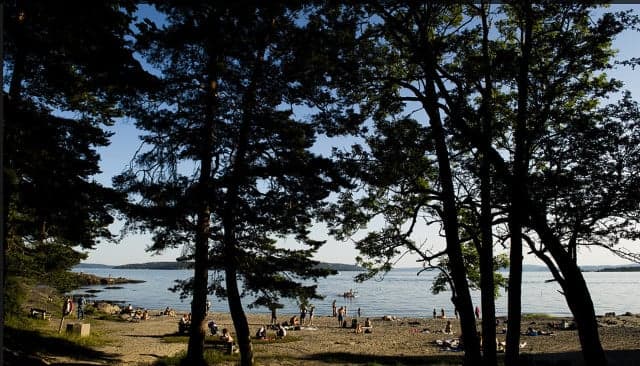Dry Swedish summer creates forest fire risk and low water levels

An unusually dry summer in Sweden has left meteorologists fretting about low water levels and the prospect of forest fires.
In two out of Sweden's three historic "lands" there has been 50 percent less rain than usual in July, with Götaland and Svealand abnormally dry for this time of the year. Even northernmost land Norrland had less rain than usual in June.
"It's getting drier than usual as a result of there being less rain. And if you look at the forecast for the next 10 days there isn't much more rain in sight," Lisa Frost, a meteorologist from national forecaster SMHI told news agency TT.
It is so dry in large parts of Götaland and Svealand that SMHI has issued warnings for forest fires, and with no significant rainfall in sight, the warning will remain in place for at least the coming week.
Groundwater levels, which were already down due to a series of winters with light snowfall, are also struggling due to the lack of rain. Levels in large reserves in eastern Götaland and western Svealand in particular have gotten worse since April.
Though bad, the situation is slightly better than previously expected, according to SMHI hydrologist Jonas Olsson:
"We have had some rainfall since the worst period. There are still low levels but not as alarming as first thought. The rain that has come has not helped fill the large water reserves however, so there are still very low levels".
Earlier this month The Local spoke to Geological Survey of Sweden (SGU) hydrogeologist Lars-Ove Lång, who explained that not everyone in the country is impacted by low groundwater levels in the same way, with the countryside likely to feel it more.
"Large and medium sized cities in many cases use surface water or supplement groundwater with surface water, which means they're not as sensitive to low ground water levels. In the countryside, it's important to improve knowledge of groundwater levels, something the government has now flagged up. The consequences can be big for those who use their own wells”.
READ ALSO: What you need to know about Sweden's water shortage
Comments
See Also
In two out of Sweden's three historic "lands" there has been 50 percent less rain than usual in July, with Götaland and Svealand abnormally dry for this time of the year. Even northernmost land Norrland had less rain than usual in June.
"It's getting drier than usual as a result of there being less rain. And if you look at the forecast for the next 10 days there isn't much more rain in sight," Lisa Frost, a meteorologist from national forecaster SMHI told news agency TT.
It is so dry in large parts of Götaland and Svealand that SMHI has issued warnings for forest fires, and with no significant rainfall in sight, the warning will remain in place for at least the coming week.
Groundwater levels, which were already down due to a series of winters with light snowfall, are also struggling due to the lack of rain. Levels in large reserves in eastern Götaland and western Svealand in particular have gotten worse since April.
Though bad, the situation is slightly better than previously expected, according to SMHI hydrologist Jonas Olsson:
"We have had some rainfall since the worst period. There are still low levels but not as alarming as first thought. The rain that has come has not helped fill the large water reserves however, so there are still very low levels".
Earlier this month The Local spoke to Geological Survey of Sweden (SGU) hydrogeologist Lars-Ove Lång, who explained that not everyone in the country is impacted by low groundwater levels in the same way, with the countryside likely to feel it more.
"Large and medium sized cities in many cases use surface water or supplement groundwater with surface water, which means they're not as sensitive to low ground water levels. In the countryside, it's important to improve knowledge of groundwater levels, something the government has now flagged up. The consequences can be big for those who use their own wells”.
READ ALSO: What you need to know about Sweden's water shortage
Join the conversation in our comments section below. Share your own views and experience and if you have a question or suggestion for our journalists then email us at [email protected].
Please keep comments civil, constructive and on topic – and make sure to read our terms of use before getting involved.
Please log in here to leave a comment.